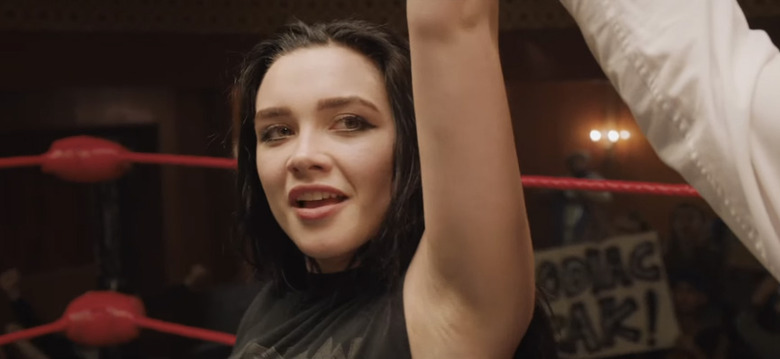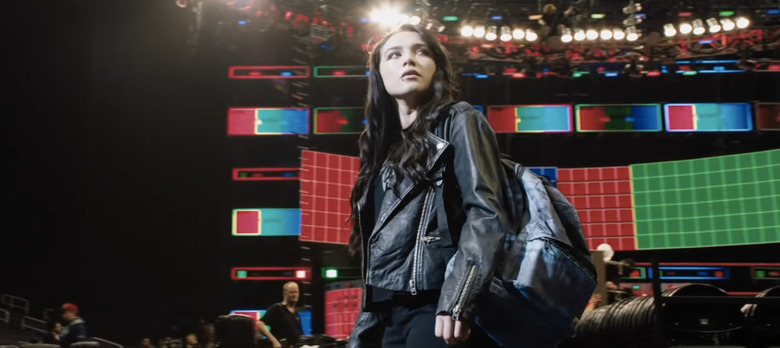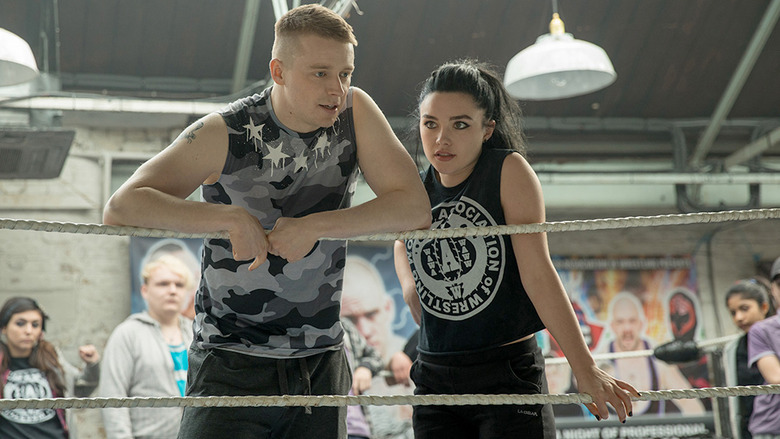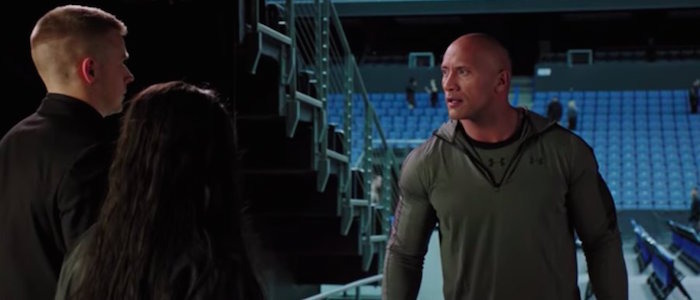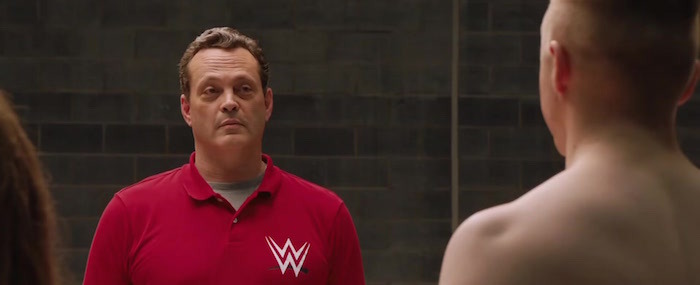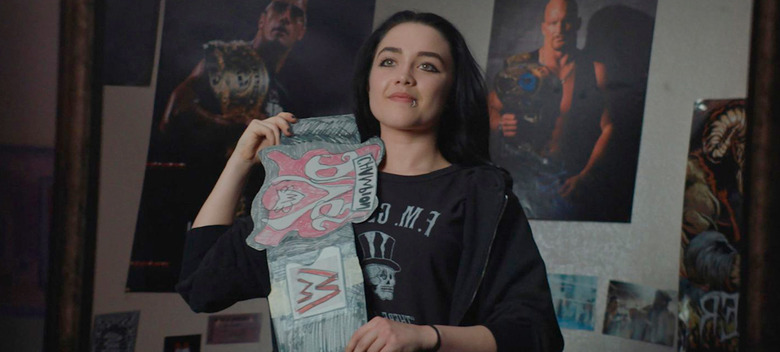Wrestling With The Fact And Fiction Of 'Fighting With My Family'
It's a given that biopics adhere to real life closely but also take creative liberties in order to (hopefully) streamline the experience for great dramatic effect within a two-hour running time. Fighting With My Family is no exception, and it is very accurate, with only a few understandably tweaked elements.
Written and directed by Stephen Merchant (and based on the Channel 4 documentary of the same name that should absolutely be sought out after watching the movie and reading this), the professional wrestling-centered film tells the story of the Knight family, an unorthodox bunch of eccentrically charming British performers from Norwich, Norfolk who run their own independent wrestling league (World Association of Wrestling). The film specifically focuses on daughter Paige (birth name Saraya-Jade Bevis), who finds herself entering the world of professional wrestling.
Let's take a look at the fact and fiction of Fighting With My Family. What actually happened? What was created for a the movie?
The Women's Revolution
Paige signed with WWE developmental at the age of 18 and went on to not only have a successful and record-breaking career (she remains the youngest Divas Champion to date, also becoming the first NXT Women's Champion along the way during what is essentially WWE's minor-league system before they call their talent up to the main roster/live television), but one that was critical in owner Vince McMahon and the rest of the top brass moving away from sex appeal, degrading bra and panties matches, and flat-out intentionally not giving the women enough time to properly tell the story of a compelling wrestling match. They were sometimes even scolded for putting on better performances than the men, subsequently instructed to water down their movements and attacks to something less fluid and realistic (I'm not going to name names, but the complaints and stories are out there).
NXT is more than a quickly evergrowing inception from WWE legend Triple H (married to Stephanie McMahon, daughter to WWE head honcho Vince McMahon), as trying new ideas there was showing that these fans who were programmed to enjoy certain things and react in crass ways (due to the shock value Jerry Springer-style car crash approach to television in the '90s that the company embraced) could refine their taste and support women's wrestling. Paige, then nicknamed the Anti-Diva for her raven-hair, pale skin complexion, stiff in-ring style, and no-nonsense attitude, became the final ingredient to what WWE needed to really rebrand their approach to women's matches. Developmental was even perplexed on how to characterize her, cluelessly suggesting her to draw influence from Lisbeth Salander of The Girl with the Dragon Tattoo franchise, which thankfully never really happened. And although she has tragically retired at the young age of 26 because of neck issues, future talent has followed in her footsteps, further proving her as a one-of-a-kind trailblazer.
NXT
Paige was actually not signed by WWE after her first tryout, but the film takes many of the reasons for her initial rejection and turns it into a plot point later in the movie where she goes through the typical sports drama motions of self-doubt and more. After moving to Florida to become a pro, Paige does not exactly make friends. (By the way, a fascinating piece of trivia is that this was not even her first time traveling to America or to another country, as since the age of 14 she had been wrestling the independent scene all over Europe, and later as an older teenager made some appearances in the all-women promotion SHIMMER based in Illinois).
She quickly becomes under the judgmental impression that the rest of the women in pro wrestling are models/stereotypical dumb blondes seeking fame or a spotlight route to alternate career paths, and generally don't have a passion for wrestling. Now, there have absolutely been some people that fit this bill in WWE, but it's not always the case when we first see someone, even if they do happen to be a model. Nevertheless, these peers have tans, photogenic bodies, blonde hair, and everything that once made a traditional female WWE superstar instantly popular.
So, throughout that arc of self-doubt, we see Paige struggle with the physicality of the training and promo skills (trash talking on the microphone), as her insult game is where she needed the most improvement. The point is, it all becomes too much; she dyes her hair blonde and gets a tan to fit in, which is played for some laughter, but is actually the reason she was rejected at her first tryout in real life. They saw through the fakeness immediately, and one of the truest tidbits from the film is that you will sink in WWE if your character is not an overly expressive version of your true self.
Zak and Roy Knight
Zak Knight was indeed rejected at the tryout, but nearly everything about his character arc seems to be a dramatic exaggeration that plays well for Hollywood movie purposes while also giving his sister more drive and reason to make it to the WWE stage for herself and growing the reputation and popularity of the family business. He was never told that his first tryout was the end of the line or that he did not have the "It" Factor (an unexplainable spark that companies do look for when signing talent), just that he needed to put on more muscle and lose some weight.
The tricky detail to weigh in on is there is no mention of him having a girlfriend or child at all in the documentary, but he is pictured with a child in his Twitter avatar, so it's very well possible that these events occurred later in life but were still worked into the film. After nursing an injury, Zak would actually have another tryout where he was placed on television in a segment getting beat up by Big Show, but was still rejected.
He does still wrestle today with his brother Roy Knight, whose real-life demons were mildly exaggerated to write him out of the narrative and focus on a one-on-one sister-brother dynamic, which is the correct call considering it is the heart of the story. The real Roy Knight did go down a dark path of criminal activity after being rejected by WWE, but he does occasionally appear in the documentary.
The Rock
Paige also did not meet The Rock backstage at any tryouts for advice, but the People's Champion was indeed the one that notified her of her debut. The rest of the family were kept in the dark (even from Paige) and had no idea of anything that was going to happen on Raw.
As far as creative decisions go, this is one of those changes that make for a more entertaining movie (who in the blue hell does not want to see Dwayne Johnson play his most famous character creation again?), but also one that will make a niche story more appealing to the general public.
The Knight Family
Clearly, the acting from Nick Frost and Lena Headey portrays parents Ricky and Julia as oddballs, sometimes cartoonish, and in the case of Ricky especially, wonderful comedic relief. And that's not far off from who they actually are. Frost is obviously turning things up a few notches, but the business-minded and family-oriented personality is the same, it's just executed with occasional broad comedy juxtaposed with dark humor derived from truth. Ricky Knight actually was jailed for eight years and did find wrestling (alongside his wife) as salvation, and the film deserves all the credit in the world for not shying away from that and indulging in nauseating sainthood.
However, I do find it surprising that the script doesn't take the time to even mention one of the most mind-blowing Paige facts even as a throwaway line; Julia was seven months pregnant wrestling with Paige and unaware, not seeing a doctor until some post-fight pain. Technically, Paige has been taking bumps from inside the womb and was literally born to do this, even if she aspired to be a zoologist before starting to wrestle.
Hutch
Those unfamiliar with wrestling will definitely have some questions about Hutch (the demanding trainer played by Vince Vaughn), considering that he is revealed to be a former no-name wrestler that never made it big, but was key to The Rock's success in the ring. Admittedly, it's a twist I am not crazy about and might unnecessarily confuse audiences, but his references (being thrown off a 20-foot cage crashing through an announce table) are a reference to WWE legend Mick Foley, who did put his body through some uncomfortably brutal situations that helped improve Rocky's reputation as a nasty heel/villain. Naturally, that also made him a bigger star. The point is that Mick Foley was a huge name, and although it's understandable why the filmmakers wanted to work in homage, the execution is spotty. Plus, by the point we learn this, the audience is so invested in Paige there doesn't need to be a twist to explain more about the "It" Factor and why her brother was rejected.
Nevertheless, it is also confirmed by Stephen Merchant that Hutch is a composite character of different developmental trainers that would have been around at the time: Dusty Rhodes, Jamie Noble, Goldust, and likely a few others. One of the greatest the industry has ever seen, late Rhodes was most responsible for improving Paige's microphone skills.
An Accurate Portrayal of WWE?
If your main takeaway from Fighting with My Family was that the depiction of the product (and Paige) don't really fit any of the negative stigmas associated with WWE, that's because the company has continuously evolved. WrestleMania 35 is less than two months away, and while it is obviously not going to be headlined by Paige, the rumored main event is a Triple Threat match for the Women's Championship between Becky Lynch (the hottest act in WWE right now and who actually performed alongside Paige and Julia on the independent circuit), Ronda Rousey (a former UFC champion and no doubt an attraction with the kind of mega-star power that further encouraged WWE to legitimize women's wrestling alongside Paige), and Charlotte Flair (the daughter of the iconic Ric Flair and a phenomenal presence in her own right).
Interestingly, Women's Championship actually existed before the Divas Championship and was actually brought back as a replacement at the desires of Paige herself and many serious-minded wrestling fans, considering the word diva is not exactly defined as a compliment and the fact that the title resembled an odd looking butterfly toy instead of the heavy gold male competitors get to proudly wear and lug around from city to city.
With that said, the film likes to push WWE's stance that if a wrestler can get over with the crowd, the company will get behind them and hand them the keys to the castle. During WWE programming parallel to Paige's journey to the big stage, the writers had to scrap their blueprint for WrestleMania 30, specifically a main event match that no one wanted to watch. Vince McMahon can be extremely stubborn and fickle 99.9% of the time, but this time they had to cave and insert Daniel Bryan (another one of the hottest acts going in wrestling) into their main event plans.
So, if you watch Fighting with My Family and enjoy it to the point of seriously considering getting into wrestling, it's important to note that following along with the storylines resembles being in an abusive relationship. That's an extreme analogy, I know, but crowds literally had to hijack the show with nonsensical chants and not pay attention to anything going on in order for the company to humble themselves and just do what the fans want. The point is that once in a blue moon, wrestling becomes some of the most emotional television there is (and to give the company credit, it is mostly them coming up with the most memorable storylines).
Much like it's discussed in the film, once you get that bug for wrestling there's no turning back. I've seen some of the highest emotional payoffs television could offer and some of the lowest, bottom-of-the-barrel scraping feces that anyone could write, yet after 20-plus years I'm still here. Trying to quit is like quitting cigarettes; you say you will while we all laugh and say "see ya Monday".
Paige vs. AJ Lee
The details of the climactic Divas Championship match are about 90% accurate, with the notable exceptions being different wrestling attire and extended length (Paige was victorious with only one move, the Paige-turner as seen in the film, which may have been a maneuver Zak Knight frequently used but one that had been Paige's finisher for quite some time in NXT). Also, AJ's bodyguard Tamina is absent in the film, which makes sense considering in the context of a film widely meant for the general public, keeping things one-on-one makes for better drama with less confusion.
The biggest change has nothing to do with the match itself, but the fact that AJ Lee is portrayed by WWE wrestler Zelina Vega. The real AJ Lee has retired from wrestling alongside her infamous husband CM Punk, who walked out on the company and fought against them in an ugly court battle. Despite CM Punk's animosity with WWE, he never ordered AJ Lee to quit wrestling or anything and it's safe to assume that he would have no problem with her working a reenactment of an important match for a Hollywood movie, so it is up for debate why the company just didn't directly cast AJ herself for the scene. Vince McMahon is capable of holding grudges for decades, so who really knows. All that matters is Zelina did a fine job getting AJ's voice and speech patterns down right while also being able to briefly work her style in the ring for a few moments.
And although Florence Pugh (who is absolutely incredible in this movie) had WWE wrestler Tessa Blanchard as a stunt double for the majority of the film, the recreation of the Divas Championship match was filmed in front of a live WWE audience at the Staples Center. So that's all Florence making every second of her training count in what had to be one of the most intense and anxiety-inducing moments of her life.
Disability Representation
Right about now, you might be confused as hell as to why I'm going to close this out talking about disabilities. It's not just because I'm a disabled writer looking for something to babble about, but mostly to bring awareness to the fact that Paige has accomplished all of this living with scoliosis she never knew she had and was never diagnosed with until WWE found out (clearly, their medical staff is on top of things and wants to take care of the talent). The movie never mentions it, but there you go.
So not only is Fighting with My Family an outstanding biopic that, as you have read, does a great job only embellishing the truth in areas that make sense, it's also one about one of the most badass, toughest humans alive mentally and physically, that achieved her dreams unknowingly with a physical disability. If that's not inspiring, I don't know what is. Hopefully, more people than ever will witness her story and go tear the stars out from the sky themselves.

